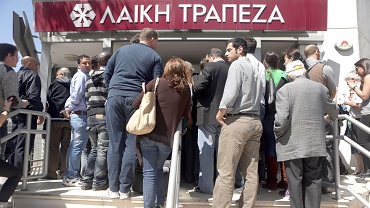In March 2013 depositors in Cyprus awoke to discover their bank balances were significantly lower than they had been the previous day. Collectively, lower by nearly 8 billion euro! They had experienced what was to become innocuously known as a “haircut”, thanks to government, banking and regulatory agencies teaming up to save collapsing banks in accordance with a radical new policy dictated by the unelected bankers at the Bank for International Settlements. The policy was invented by derivatives dealers (high-stakes gamblers who prey on vulnerable investors and loot the real economy by manipulating markets and indexes) and codified by private bankers from an institution that got its start facilitating Nazi Party finances. (“Shut down fascist BIS bankers’ cabal!”, AAS, 6 Mar. 2019.)
Those Cypriots could not withdraw the remaining money in their accounts. Banks were initially closed for two weeks, and daily limits of €300 were placed on withdrawals thereafter. Various controls on bank capital remained in place for two years. Almost 48 per cent of uninsured deposits (deposits over the guaranteed €100,000) held by the largest Cypriot bank, Bank of Cyprus, were lost, and all uninsured deposits in the second-largest Cyprus banking group, Laiki (also known as Cyprus Popular Bank), were wiped out. Securities worth an additional €1.2 billion were converted into bank shares. Confiscated deposits were shifted into worthless equity in the collapsing bank, creating a new category of shareholder, while the stakes of existing shareholders were diluted down to less than 1 per cent, with the nominal value of ordinary shares reduced from €1 to €0.01 each.
Six years after the bail-in, once the sale of Laiki Bank’s subsidiaries was completed, it was expected that the victims who were compensated with shares would receive 6 cents for every euro taken from them (6 per cent), from money recouped from the sale of increasingly worthless bank assets. At that time—July 2019—the resolution authority was still looking for a liquidator. For a bank resolution that should have taken two years at most to complete, there was still no end in sight for workers, elderly citizens and pensioners who had lost their life savings.
Early this year, on 8 January 2021—nearly eight years after the event—the Central Bank’s Resolution Authority finally made the liquidation filing with the district court. Laiki’s liquid assets were valued at €232 million; in 2013 they were worth up to €900 million. Time-consuming legal and other complexities were cited for the delay, which resulted in the steep decline in value.
Legal action
In the meantime, depositors banded together to take legal action against the government. Christos Georgiou, a 70-yearold retiree who lost €430,000 in the haircut, told the Cyprus Mail that the money corresponded to ten years of work. He saw “the fruits of my life’s work gone in one night. I did survive but others didn’t. There are people who fell ill from being so upset and stressed out over losing their money”, he said. A businessman saw his clients’ money, his payroll of several months, and money reserved for tax payments stolen. Clients and suppliers had to be repaid and the government still demanded the tax payments they’d already taken! “It was a triple blow”, the man said.
Numerous court cases were filed at district courts, but by 2018, no single case had yet been heard. That year, a class action suit involving 1,000 plaintiffs was lodged with the General Court of the European Union, directed against the European Council, the European Commission, the European Central Bank (ECB) and the Eurogroup. But in July 2018 the General Court of the EU dismissed a case by 51 bank victims, stating that the complainants had “not succeeded in demonstrating an infringement of the right to property, of the principle of protection of legitimate expectations, or of the principle of equal treatment”. An earlier case for compensation, heard by the European Court of Justice in September 2016, was also dismissed. In 2018 a trial commenced at the Nicosia criminal court concerning charges of market manipulation and submission of misleading financial statements on the part of Laiki Bank. Three criminal cases were launched against Bank of Cyprus, also regarding market manipulation, including reclassification of bonds to cover up bank losses. Two did not proceed to convictions; the outcome of the third is yet to be determined. Another unsettled matter regards a €25 million solidarity fund for victims which was approved by Cabinet but has been blocked by the opposition.
Now it has come to light that another lawsuit brought to the Nicosia district court by victims has been rejected. It sought a declaration that the action of the government, the Central Bank and the Bank of Cyprus to bail in depositors was unconstitutional and illegal. On 22 October 2021 the court made an extraordinary ruling: It found that the decree for resolution (bail-in) of the banks “was absolutely necessary for reasons of public interest and public benefit, in order to prevent the collapse of the entire financial system sector with catastrophic consequences for the country’s economy and society.” Even more shockingly, the court noted that the government action was necessary due to the 25 March 2013 decision of the Eurogroup to preclude recapitalisation of the banks from EU/ IMF funding programmes, therefore restricting the country’s actions to those that did not require additional funding. At the time, “there were no alternatives”, the court ruled.
Cyprus was the test case for bail-in, and the world, which has followed its lead due to the prescriptions of the BIS, must take note of the consequences. For nations under the thumb of the EU, this is an issue of sovereignty! If national sovereignty is restored, the alternatives denied by EU authorities suddenly become possible, starting with reorganising the bankrupt financial system; re-regulation modelled on the US depression-era Glass-Steagall Act to prevent banks speculating; and national banking to fund an economic recovery. (For more information see citizensparty.org.au/stop-bail-in)
By Elisa Barwick, Australian Alert Service, 3 Nov. 2021







